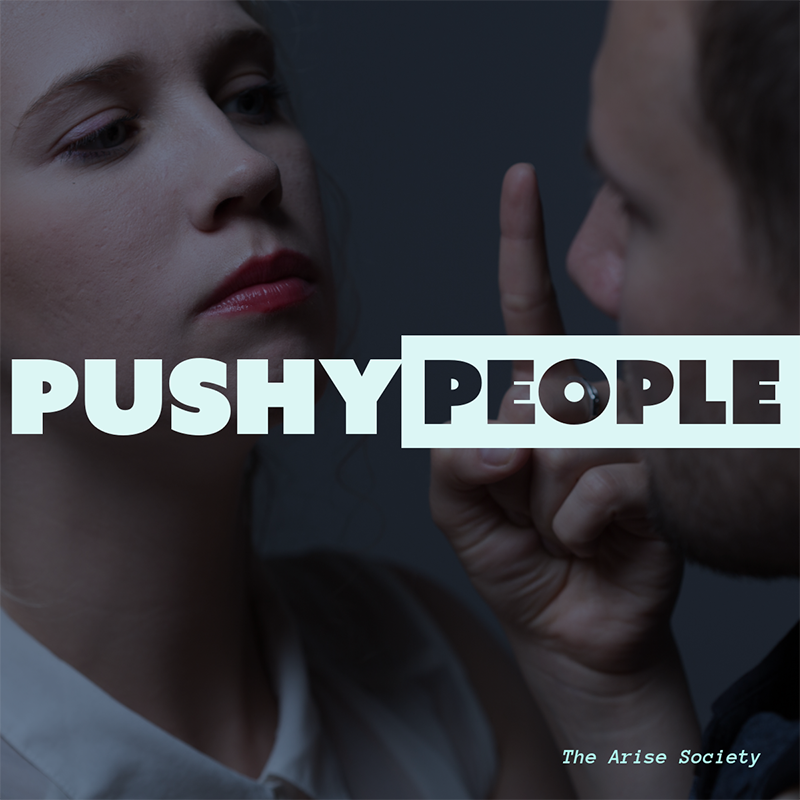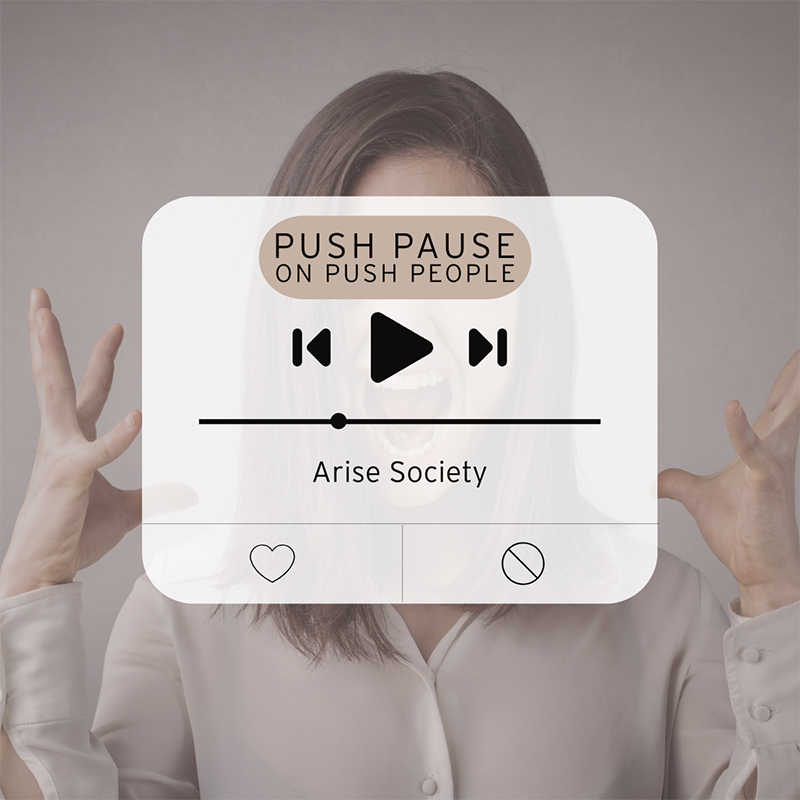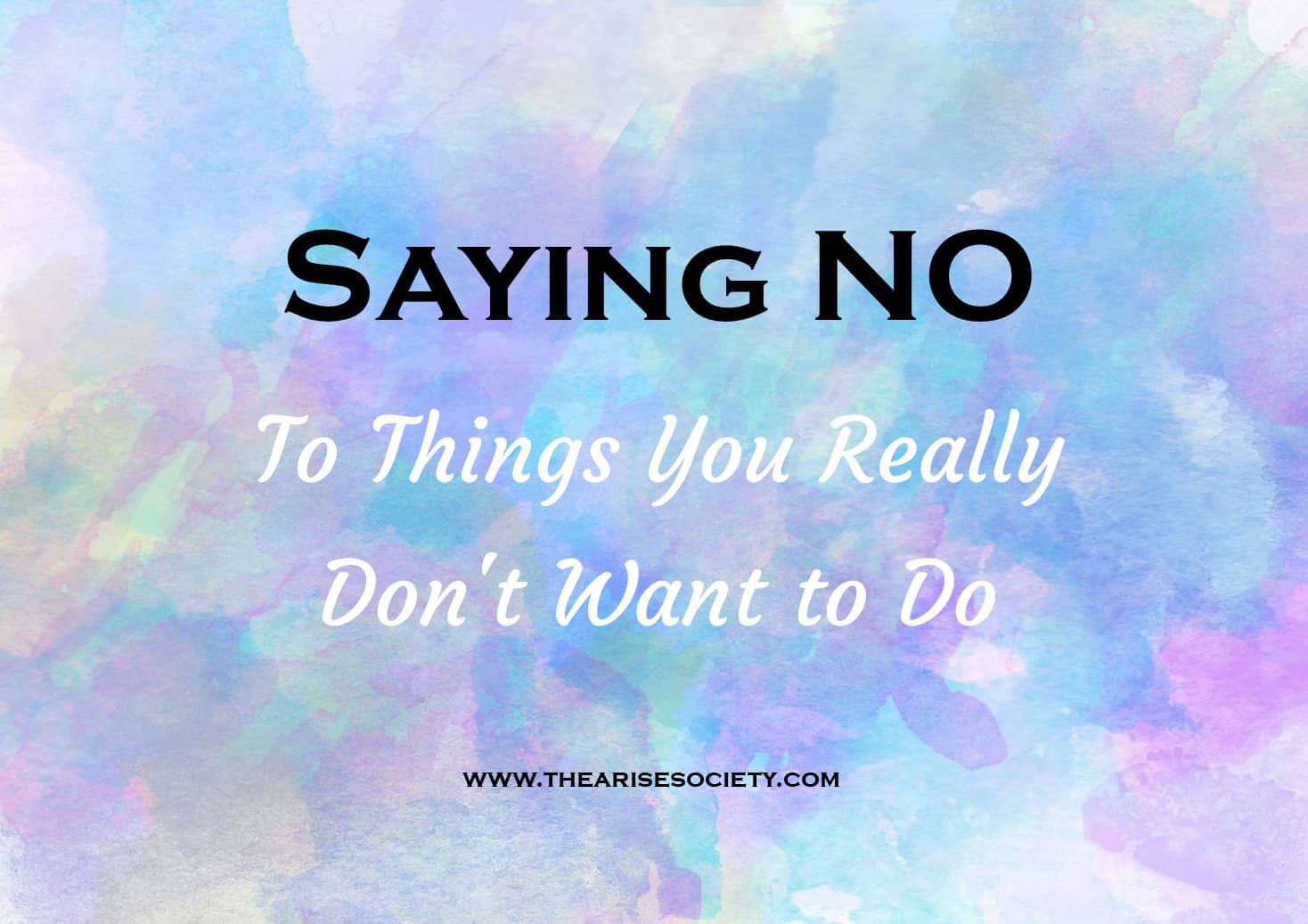How to Deal With Pushy People
Dealing with pushy people can feel overwhelming, especially if you lean toward being agreeable. The good news is that the word “no” can be your greatest ally. Contrary to how it might sound, “no” isn’t negative. It sets healthy limits and protects your well-being.
Have you ever said “yes” when you secretly wanted to say “no”? It usually happens out of fear—maybe you worry about conflict, disappointing someone, or looking selfish. Over time, constantly giving in builds stress and resentment. Remind yourself that saying “no” doesn’t make you a bad person. In fact, it’s a sign of self-respect. You’re acknowledging your own needs and creating space for them to breathe.
Try these simple steps to assert your boundaries:
- Pause Before Saying Yes: Give yourself a moment to think.
- Use Direct Language: Politely but firmly say, “No, I can’t do that right now.”
- Suggest an Alternative (If You Want To): Offer a different option or a later time if it feels appropriate.

Understanding Pushy Behavior
Before you can effectively handle pushy people, it helps to know where their behavior comes from. Pushiness isn’t a permanent character flaw—it’s usually driven by deeper motivations.
Many pushy individuals have a strong need for control. They want events and people to fit into their own plans, often due to insecurity or fear of uncertainty. They may also struggle to recognize boundaries, focusing on their own goals without considering how they’re affecting you.
While it’s helpful to see the deeper reasons behind someone’s pushiness, remember it doesn’t excuse the behavior. Your boundaries still matter. Empathy can guide your response, but it’s equally important to stand firm in your convictions.

Giving in to pushy people and over-committing can be damaging to your health
Your self-image can suffer.
- When you find yourself doing too much, you can be in a spiral of blaming yourself when it turns out you can’t do everything well. Instead, you may start feeling like a failure with each missed deadline. This leads to negative self-talk and possibly some damage to your mental health.
You can experience higher anxiety.
- When there are not enough hours in the day, you find yourself frantic and always ‘putting out fires.’ This kind of anxiety is exhausting, not to mention can lead to panic attacks if left untended.
You can be more at risk for depression.
- When you don’t say ‘no’ to things you really don’t want to do, you’ll find you not only lack enthusiasm for the project, but after a while, a bleak mood and even depression can overtake you when you try to work on that project.
It can be exhausting.
- When you’re overly committed to things you’d rather not be doing, it wears on the entire body, giving you a tired feeling, and can lead to physical exhaustion. People have been known to experience heart palpitations and other very physical symptoms when they repeatedly run themselves into the ground.
Things to remember when you want to say no to a pushy person
Saying ‘no’ makes you a priority.
- We only get 24 hours in a day, and don’t have the resources to say ‘yes’ to everyone. You have to decide whether a project is worth your time – or if that time might be better spent doing something else.
‘No’ isn’t a rejection.
- Just because you’re turning something or someone down, that doesn’t mean you’re somehow negating the person who did the asking.
Not every ‘No’ has to be a solid no.
- Sometimes a compromise might be in order. If something really does pique your attention, see if there’s a way you can be involved without having to put in the full commitment – especially if you’re already busy with other things.
‘No’ doesn’t have to come with a guilt trip.
- Just as there’s no harm in someone else asking for your help with something, you also have the same right to say no. If you’ve considered the request seriously and felt that saying ‘no’ was the right thing to do – then go with your gut. Say no. End of story.

Strategies for dealing with push people while still being nice
There’s always someone who won’t take ‘no’ for an answer. How you handle pushy people (which can include family and friends) is the difference between keeping your sanity or becoming so overextended that you no longer can tell which end is up. What follows are some tips for managing difficult individuals.
Be firm.
- If the person you’re talking to keeps pushing, then change the subject (or walk away if necessary). If you’re not firm in your answer, you can’t be expected to be taken seriously. A confident tone is all the difference between having your answer accepted for what it is, and in being pressured to change your mind.
Cut the apology and excuses.
- When you start off with saying you’re sorry, you’re taking a weaker and more submissive position. When you spend time giving lengthy reasons as to why you can’t do something, the person who asked might feel like you’re offering an opening to further arguments. Run-on explanations and excuses can make someone think you are not telling the truth. Keep your words brief.
Buy yourself some time.
- Rather than say ‘yes’ or ‘no’ right away, say that you need some space to consider the matter. Then take the time you need to make an informed decision. The best part? By taking the time to think about things on your own, you’re not being pressured with an urgency to decide. This puts the control back where it belongs – in your hands.
Hold that thought.
- Very politely let the other person know that as much as you’re interested, you simply don’t have the time right now, but would love to jump in later if your schedule permits. This shows you’re enthusiastic and interested – just overbooked.
When saying ‘no’ to one thing, try finding something you can say ‘yes’ to.
- If possible, find an alternative perhaps to what you’re being asked to do, something with less of a commitment that interests you.
Be clear with what you mean.
- Watch your language and be careful not to mislead someone. Saying things the wrong way can lead to confusion or even the thought that you intend to revisit the decision, when what you actually mean is ‘no.’
Body language and attitude.
- With everything, remember that body language and your attitude count. Be sincere but be definite about what you can and can’t do. People will respect you for that – even if you are saying ‘no’ to their request.
Compliment and retreat.
- Find something nice to say about the person, project, company, or what you’d like about being involved – and then let them know that as much as it sounds good, it’s really not a good fit for you at this time.
Saying ‘no’ gets easier with practice, so don’t beat yourself up if you falter along the way. In no time, even the pushiest of people won’t be able to convince you to do something you don’t want to do. Learn how to use ‘no’ effectively, and your life will become infinitely easier.
If you’re still having trouble saying ‘no’ it’s because you need to do some work on your personal boundaries. Resolving this will take dedication. In some cases, talking to a counselor might be necessary to guide you on your journey to saying ‘no.’ Do not be afraid to ask for help.
Pushy People May Be Dealing with Mental Health Conditions
In some cases, you might find yourself dealing with individuals who exhibit persistent pushy behavior due to certain mental health conditions, such as Borderline Personality Disorder (BPD). Those with BPD often fear abandonment and rejection, which can result in aggressive or manipulative behavior in an attempt to maintain control over their relationships.
Interactions with individuals suffering from BPD can be particularly challenging due to the intensity and unpredictability of their emotional responses. In such scenarios, seeking assistance from a licensed mental health professional can be extremely beneficial. Therapists or counselors trained in dealing with BPD can provide valuable insights and strategies to help you manage these interactions while maintaining your own mental well-being. You can learn more about this in our article Saying No to Someone with Borderline Personality Disorder.

Quick Tips – How to Deal with Pushy People
Handling pushy individuals can be a delicate task. Here are some effective strategies to consider:
1. Set Clear Boundaries: Your personal and professional boundaries are crucial. Clearly express your limits and expectations to pushy individuals. Make it known when a boundary is crossed.
2. Be Assertive: Stand up for yourself while maintaining respect for the other person. Clearly express your thoughts and feelings without getting defensive or aggressive.
3. Practice Saying ‘No’: As we previously discussed, learning to say “no” is a powerful tool. Practice expressing refusal in a firm yet respectful manner.
4. Stay Calm: Pushy individuals might try to fluster you into agreeing with them. Stay composed and keep your emotions in check to handle the situation objectively.
5. Seek Help: If the pushy behavior continues despite your efforts, seek advice or intervention from a trusted mentor, HR representative, or a professional like a therapist or counselor.
Remember, dealing with pushy people is a skill that can be developed over time. Patience with yourself and persistence in applying these strategies are key.
Helpful Video: How to Deal with Pushy People**
Video Summary
In his TEDx talk at LivoniaCCLibrary, Jay Johnson explores effective strategies for dealing with difficult people, emphasizing the role of behavioral intelligence. He highlights the natural human responses to conflict and provides insightful methods to manage and improve these challenging interactions. The talk underscores the importance of self-regulation and understanding in transforming potential conflicts into opportunities for growth and cooperation.
Key Takeaways:
- Recognize Natural Responses: Our brain’s limbic system triggers a fight-or-flight response when facing difficult people, leading to physical and emotional stress.
- Impact of Conflict: Workplace conflicts can lead to negative outcomes like turnover, absenteeism, and project failures, underlining the need for effective conflict management.
- Changing Perspectives: Instead of trying to change others, we should focus on modifying our own responses and perceptions.
- Understanding Archetypes: Recognizing common difficult archetypes, like the non-listener or the one-upper, can help us better navigate interactions.
- Behavioral Intelligence: This framework helps explain, predict, influence, and control behaviors in the context of difficult interactions.
- The Power of Questions: Asking why someone behaves in a certain way can unveil motivations and lead to better understanding and less conflict.
- Inclusive Language: Using phrases that include both parties (e.g., “we”) can prevent defensive reactions and foster cooperative dialogue.
- Recognition and Reward: Positive reinforcement can shift dynamics and improve relationships with challenging individuals.
- Self-Control Techniques: Simple actions like taking deep breaths or counting to ten can calm the limbic system and allow for more rational responses.
- Separating Person from Behavior: Distinguishing a person from their behavior helps reduce personal bias and facilitates more objective interactions.
Video Conclusion
Jay Johnson’s approach to dealing with difficult people through behavioral intelligence offers a transformative perspective on interpersonal relations. By focusing on self-awareness, understanding, and strategic communication, we can turn interactions with challenging individuals into opportunities for personal and professional growth. This not only enhances workplace dynamics but also contributes to our overall well-being, proving that managing our reactions is often more impactful than attempting to change others.
Conclusion
Dealing with pushy people is more than a mere social skill; it’s essential to maintaining your mental well-being and assertiveness in all walks of life. Effective management of such interactions can lead to healthier relationships, improved confidence, and even career advancements.
Each interaction with a pushy individual presents a learning opportunity. By understanding their behavior and employing effective strategies, you transform these challenging encounters into steps toward personal growth. And remember, it’s okay to seek professional help when you need it, especially when dealing with complex situations like dealing with individuals with Borderline Personality Disorder.
Personal development is a journey, not a destination. Keep growing, keep learning, and remember to prioritize your needs and boundaries. In the words of the American psychologist Abraham Maslow, “Growth takes place when the next step forward is subjectively more delightful, more joyous, more intrinsically satisfying than the previous gratification which we have become familiar and even bored.”
At the Arise Society, we help young adults that are struggling with anxiety, depression, gaming and other motivational issues. We provide personalized academic, therapeutic, and social support in a real-world setting, which gives our students the skills to reach their fullest potential. Follow us on Facebook for updates or reach out to us directly here.

How to Deal With Pushy People – FAQs:
- What are the negative effects of being too agreeable with pushy people?
- Being too agreeable can lead to being taken advantage of, feeling undervalued, and experiencing self-doubt after aggressive conversations.
- Why is it important to learn the power of saying “no”?
- Saying “no” is a sign of self-respect and self-awareness. It helps in setting boundaries, prioritizing one’s well-being, and preventing stress, resentment, and burnout.
- What drives the behavior of pushy individuals?
- Pushy behavior is often rooted in a strong need for control, insecurities, and a fear of uncertainty. Such individuals may also have poor boundary recognition.
- How can understanding pushy behavior help in dealing with pushy people?
- Understanding the motives behind pushy behavior can lead to responding with more empathy and patience. However, it’s still essential to protect one’s boundaries.
- What are the potential health risks of giving in to pushy people?
- Over-committing can lead to a damaged self-image, increased anxiety, risk of depression, and physical exhaustion.
- How can one effectively say “no” to a pushy person without feeling guilty?
- Remember that saying “no” prioritizes your needs, isn’t a rejection of the person asking, and doesn’t always have to be a solid refusal. It’s essential to trust your judgment and not accompany the refusal with a guilt trip.
- What are some strategies to handle pushy people while still being polite?
- Some strategies include being firm, avoiding lengthy excuses, buying time to make decisions, being clear in communication, and offering alternatives when possible.
- How might mental health conditions influence pushy behavior?
- Some individuals, such as those with Borderline Personality Disorder (BPD), may exhibit pushy behavior due to fears of abandonment and rejection, leading to aggressive or manipulative actions.
- What are some quick tips for dealing with pushy individuals?
- Set clear boundaries, be assertive, practice saying “no,” stay calm, and seek help if needed.
- Why is it essential to develop skills in dealing with pushy people?
- Managing interactions with pushy individuals is crucial for mental well-being, assertiveness, healthier relationships, improved confidence, and personal growth.
These FAQs provide a concise overview of the main points from the article and can serve as a quick reference for readers.

Get In Touch
Orem, UT 84058
thearisesociety.com
Phone: (801) 300 - 9995
Fax: (801) 405 - 0103



